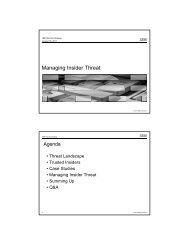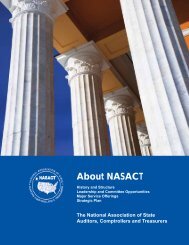Advisory Committee on Tax Exempt and Government Entities (ACT ...
Advisory Committee on Tax Exempt and Government Entities (ACT ...
Advisory Committee on Tax Exempt and Government Entities (ACT ...
You also want an ePaper? Increase the reach of your titles
YUMPU automatically turns print PDFs into web optimized ePapers that Google loves.
The Appropriate Role Of The Internal Revenue Service With Respect To <strong>Tax</strong>-<strong>Exempt</strong> Organizati<strong>on</strong> Good Governance Issuesbusiness. In various c<strong>on</strong>texts, as the IRS has labored to draw that line, it has created aper se requirement for exempti<strong>on</strong> that requires the organizati<strong>on</strong> be governed by anindependent body. The IRS’s positi<strong>on</strong>, however, has not always been sustained by thecourts <strong>and</strong> we are c<strong>on</strong>cerned about per se requirements.Governance Issues Involving Determinati<strong>on</strong>s. Both stages of the determinati<strong>on</strong>process—the completi<strong>on</strong> <strong>and</strong> submissi<strong>on</strong> of Form 1023; <strong>and</strong> the administrative processwhere the IRS determines whether exempti<strong>on</strong> is merited—address governance matters.We were not able to find guidance as to how the IRS takes governance issues intoaccount in the determinati<strong>on</strong> process, except in limited instances in the health care <strong>and</strong>low-income housing joint venture areas. We certainly appreciate that governance canbear <strong>on</strong> the operati<strong>on</strong>al test, am<strong>on</strong>g other issues. Our pers<strong>on</strong>al experience <strong>and</strong>research for this report suggest, however, that the IRS may require specific governancepractices <strong>on</strong> an ad hoc <strong>and</strong> inc<strong>on</strong>sistent basis. For example, determinati<strong>on</strong> specialistsmay require organizati<strong>on</strong>s seeking exempti<strong>on</strong> to have independent boards or at leastsome independent board members. Similarly, despite the fact that the Form 1023specifically states that a c<strong>on</strong>flict of interest policy is recommended but not required, ourexperience <strong>and</strong> interviews suggest that determinati<strong>on</strong> specialists often require adopti<strong>on</strong>of such a policy, <strong>and</strong> occasi<strong>on</strong>ally require adopti<strong>on</strong> of the sample form of policy includedwith the Form 1023 instructi<strong>on</strong>s. We appreciate we have <strong>on</strong>ly anecdotal evidenceregarding governance issues in the determinati<strong>on</strong> process. It is, however, ourimpressi<strong>on</strong> that the “when” <strong>and</strong> “what” are unclear <strong>and</strong> not uniformly applied. We arec<strong>on</strong>cerned about the IRS having this level of discreti<strong>on</strong> in cajoling or requiring specificgovernance process, particularly in the determinati<strong>on</strong> phase, where there usually is notrack record evidencing operati<strong>on</strong>al failures.Governance Issues Involving Form 990 Disclosure. The additi<strong>on</strong> of a number ofgovernance-related questi<strong>on</strong>s to the recently redesigned Form 990 serves as furtherdem<strong>on</strong>strati<strong>on</strong> of the IRS’s growing involvement in the area. The IRS’s approach to theredesigned Form 990 for 2008 has been a model of inclusiveness <strong>and</strong> collaborati<strong>on</strong>.We believe in large part the governance questi<strong>on</strong>s <strong>on</strong> the redesigned Form 990 for2008 are appropriate <strong>and</strong> formulated in a relatively neutral manner, recognizing that trueneutrality is an unattainable goal. The inclusi<strong>on</strong> of the questi<strong>on</strong>s, however, inherently(<strong>and</strong> intenti<strong>on</strong>ally) suggests that the IRS supports adopti<strong>on</strong> of specific governancepolicies <strong>and</strong> practices. The danger then is that organizati<strong>on</strong>s will take the path of leastresistance <strong>and</strong> adopt the policies <strong>and</strong> practices whether or not they are appropriate forthem, or effective in their c<strong>on</strong>text.Governance Issues in the Examinati<strong>on</strong> or Other Compliance Initiative C<strong>on</strong>text. As withdeterminati<strong>on</strong>s, the IRS c<strong>on</strong>siders an organizati<strong>on</strong>’s governance in the c<strong>on</strong>text of anaudit or other compliance initiative. However, the audit c<strong>on</strong>text differs significantly fromdeterminati<strong>on</strong>s in that the organizati<strong>on</strong> has a track record <strong>and</strong> the IRS is, or should be,c<strong>on</strong>sidering the organizati<strong>on</strong>’s actual operati<strong>on</strong>s in ascertaining whether theorganizati<strong>on</strong> qualifies for exempti<strong>on</strong>. Thus, where there are violati<strong>on</strong>s of the st<strong>and</strong>ardsfor exempti<strong>on</strong>, the IRS rightfully has a greater interest <strong>and</strong> duty <strong>and</strong> corresp<strong>on</strong>dinglyincreased latitude to address misbehavior. However, we were not able to findADVISORY COMMITTEE ON TAX EXEMPT AND GOVERNMENT ENTITIES (<strong>ACT</strong>) June 11, 2008 3













